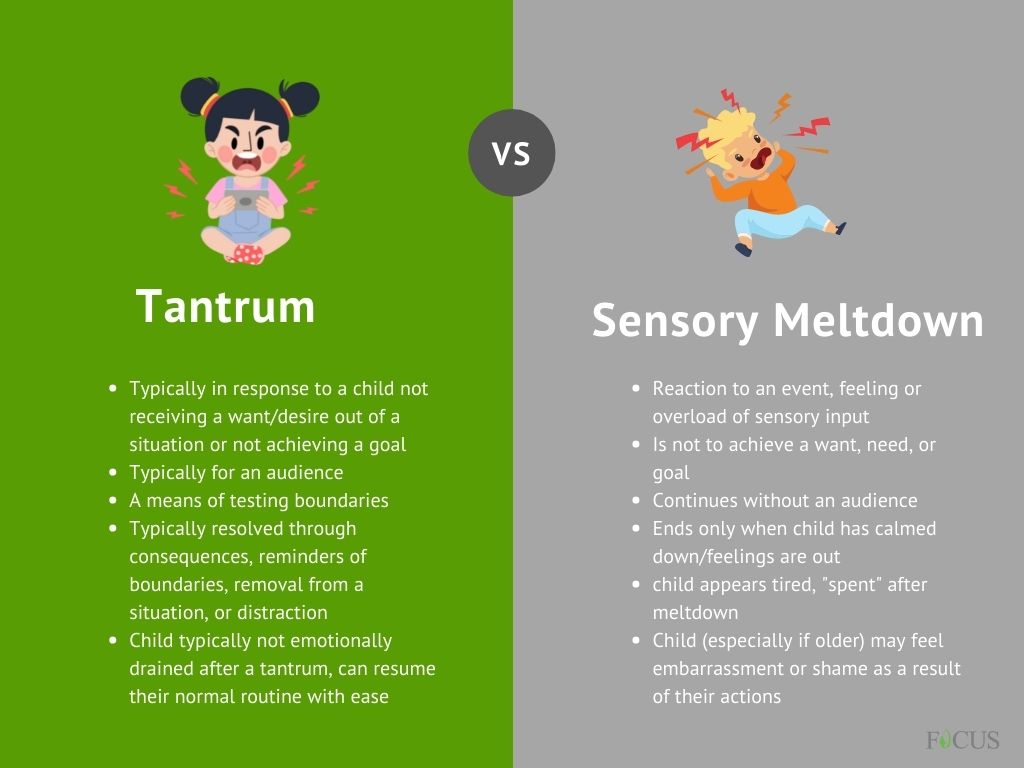Blog

Tantrum or Sensory Meltdown? Fort Myers ABA Therapists Explain
When working with kids who have varying sensory struggles, it can be difficult to tell the difference between a tantrum or a sensory meltdown. Our Fort Myers ABA therapists recognize that it often takes some detective work to differentiate. But determining which is which is important when formulating the most effective response.
A sensory meltdown can be especially tough to identify because a child’s sensory thresholds can vary from day-to-day or even hour-to-hour.
Some behaviors that may be present in BOTH:
- Screaming
- Kicking
- Name-calling
- Hitting
- Crying
- Hiding or avoidance
Tantrums, however are typically a response to a child not receiving something they want or an anticipated outcome. Sensory meltdowns, meanwhile, stem from sensory overload, with reactions being to the big feelings that the overload can cause.
In the case of a meltdown due to sensory issues, parents may need to formulate a strategy that plans ahead, rather than simply react to the meltdown when it happens. That means meeting their sensory needs through a sensory diet (unique to each child) that can help them avoid feeling completely overloaded and overwhelmed.
We need to look carefully at the sorts of things that can trigger a sensory meltdown. Some possible meltdown triggers can include:
- Being overly tired or hungry.
- Generally not feeling well. (This can stem from illness, food sensitivity, overheating, etc.)
- Being expected to “hold it together” for long periods of time, such as going to summer camp, school, or on play dates.
- An abrupt change in routine – anything outside of the ordinary – can set off sensory overload.
Because the overload may not be immediate, it can sometimes appear like a meltdown “came out of nowhere.” But there is almost always a source when we look very carefully at the “antecedents,” or events that occurred prior to the meltdown. You may even have to go back a few days to pinpoint the cause.
Toddlers and preschoolers may be especially prone to tantrums because they do not have the motor, language, or problem-solving skills to work through some of their frustrations on their own. They may have an emerging desire to be independent, without having the skills to actually BE independent. They might have emerging language skills, and thus are unable to communicate what they actually want or need. They may have big feelings, but lack the prefrontal cortex development to emotionally regulate. They may have a growing understanding of the world around them, but also a lot of anxiety about how to move through it.
Tantrums usually only end when a child gets what they want or when they’re rewarded for better behavior.
Meltdowns, on the other hand, only end when the child tires out or the sensory input is altered. They stem from what we sometimes refer to as a “physiological traffic jam” in the central nervous system. There is too much overstimulation and feeling limited in your ability to “exit.” This can trigger a “fight or flight” response.
As parents, therapists, teachers, and caregivers, it’s important to recognize that the behaviors we’re seeing are not controllable behavioral reactions. Rather, they are physiological responses. This is why our Fort Myers ABA therapists and occupational therapists put such emphasis on identifying which is which so that you can appropriately respond.
With tantrums, you need to recognize the motivation or purpose, reinforce positive behavior, and build skills for success.
Meltdowns, however, can sometimes be avoided when we use visual schedules, social stories, and checklists to help kids know what is expected. There are no surprises or question marks. Reducing the unexpected changes in routine is going to reduce the overall stress that can trigger a meltdown.
We also recommend routine sensory diet activities, like scheduling quiet time or offering them breaks for sensory input.
Parents and teachers should also be able to recognize signs of a child’s distress. This could be covering their ears or rocking back-and-forth or humming or bolting from the room. Once you are able to quickly recognize the signs of overstimulation, you can respond to help them regulate before reaching the meltdown stage.
FOCUS offers pediatric ABA therapy in Fort Myers and throughout Southwest Florida. Call (239) 313.5049 or Contact Us online.
Additional Resources:
Expert Ways to Help Tame Tantrums and Manage Meltdowns, June 18, 2021, By Alescia Ford-Lanza, MS, OTR/L, ATP, Autism Parenting Magazine
More Blog Entries:
Study: Less than 1/2 Kids With Autism Undergo Early Intervention Therapy, July 30, 2022, FOCUS ABA Therapy Blog

Comments are closed.